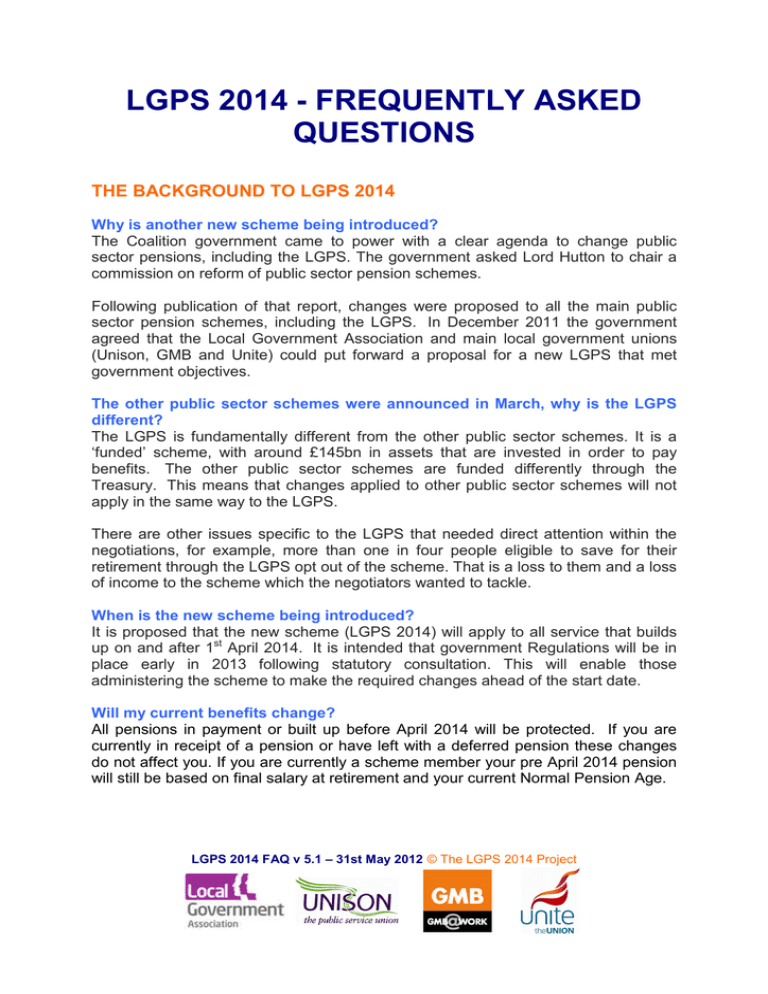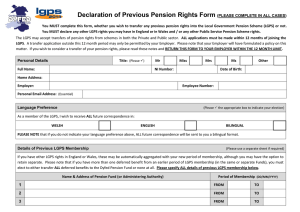LGPS 2014 - FAQs - National Union of Teachers
advertisement

LGPS 2014 - FREQUENTLY ASKED QUESTIONS THE BACKGROUND TO LGPS 2014 Why is another new scheme being introduced? The Coalition government came to power with a clear agenda to change public sector pensions, including the LGPS. The government asked Lord Hutton to chair a commission on reform of public sector pension schemes. Following publication of that report, changes were proposed to all the main public sector pension schemes, including the LGPS. In December 2011 the government agreed that the Local Government Association and main local government unions (Unison, GMB and Unite) could put forward a proposal for a new LGPS that met government objectives. The other public sector schemes were announced in March, why is the LGPS different? The LGPS is fundamentally different from the other public sector schemes. It is a ‘funded’ scheme, with around £145bn in assets that are invested in order to pay benefits. The other public sector schemes are funded differently through the Treasury. This means that changes applied to other public sector schemes will not apply in the same way to the LGPS. There are other issues specific to the LGPS that needed direct attention within the negotiations, for example, more than one in four people eligible to save for their retirement through the LGPS opt out of the scheme. That is a loss to them and a loss of income to the scheme which the negotiators wanted to tackle. When is the new scheme being introduced? It is proposed that the new scheme (LGPS 2014) will apply to all service that builds up on and after 1st April 2014. It is intended that government Regulations will be in place early in 2013 following statutory consultation. This will enable those administering the scheme to make the required changes ahead of the start date. Will my current benefits change? All pensions in payment or built up before April 2014 will be protected. If you are currently in receipt of a pension or have left with a deferred pension these changes do not affect you. If you are currently a scheme member your pre April 2014 pension will still be based on final salary at retirement and your current Normal Pension Age. LGPS 2014 FAQ v 5.1 – 31st May 2012 © The LGPS 2014 Project Are there likely to be further changes in the future? The intention of unions and employers is to keep the cost of LGPS 2014 stable so that further fundamental changes are not needed. The agreement reach in December 2011 set out a two stage process to scheme reform. The first stage centred on benefit design. The second focuses on cost management and reform to the governance of the scheme including the involvement of employers, trade unions and members in the decision-making and running of the LGPS. That series of discussions is called ‘Workstream 2' and has begun. Where can I find out more about the LGPS reform process? You can find out more on the LGPS website at www.lgps.org.uk TYPE OF PENSION SCHEME Will I still know what pension to expect when I retire under the LGPS 2014? Yes, just like the LGPS 2008, the LGPS 2014 is a ‘defined benefit’ scheme. But instead of being a final salary scheme, the LGPS 2014 is a ’career average revalued earnings’ scheme - also known as a CARE scheme. Both final salary and career average are types of defined benefit pension scheme. What is a ‘CARE’ scheme? 'CARE' stands for Career Average Revalued Earnings. Your pension will build up as a proportion of your pensionable pay - 1/49th for each year in the LGPS 2014. So instead of calculating your pension with reference to your final salary on retirement, the LGPS 2014 uses the average of your annual earnings over your membership of the LGPS. Earlier years are revalued by inflation (CPI) to ensure that each year's salary is of equivalent 'real' value. What’s included in ‘pensionable pay’ for contributions and benefits in the LGPS 2014? Both contributions to and benefits from the LGPS 2014 will be based on your actual pensionable pay. For part time workers this means that your pensionable pay will not be converted into a full time equivalent figure. The definition of pensionable pay in the new scheme will include non contractual overtime and additional hours worked by part time staff, these are parts of earnings currently excluded from the definition of pensionable pay in the LGPS 2008. Is it true that career average schemes are always worse than final salary schemes? For a significant proportion of members the LGPS 2014 will produce a better pension than they would have got under a continued final salary scheme. Final salary suits some career patterns, usually those with a structured promotional scale. Career average is a better fit for those whose opportunity for promotion is limited. Individual circumstances differ but there is nothing automatically worse about career average schemes. In fact the improved accrual rate in the LGPS 2014 could mean many members build up better pensions. LGPS 2014 FAQ v 5.1 – 31st May 2012 © The LGPS 2014 Project MEMBER CONTRIBUTIONS How much will I contribute when the new scheme starts? Overall the average contribution from members will be 6.5% in the LGPS 2014, the same as in the LGPS 2008. However, the structure of member contributions is different. This reflects the use of actual rather than full time equivalent salary when determining the contribution rate and the impact that current pensions tax relief has on the real cost of contributing. The new contribution bands take tax relief and level of income into account and are more ‘progressive’, this means that contributions increase with earnings. Actual Pensionable Pay Headline/Gross Contribution Contribution After Tax Relief Up to £13,500 5.5% 4.40% £13,501 - £21,000 5.8% 4.64% £21,001 - £34,000 6.5% 5.20% £34,001 - £43,000 6.8% 5.44% £43,001 - £60,000 8.5% 5.10% £60,001 - £85,000 9.9% 5.94% £85,001 - £100,000 10.5% 6.30% £100,001 - £150,000 11.4% 6.84% More than £150,000 12.5% 6.88% LGPS 2014 FAQ v 5.1 – 31st May 2012 © The LGPS 2014 Project Will my contributions go up? The contribution rates for the majority of members will not increase and some members such as part-time staff may pay at a lower rate than now. Those in the top bands will see their rates increase as we move to a more progressive structure ‘net of tax relief’. What will my contributions be between now and April 2014? In the current LGPS 2008, contribution bands are indexed to CPI. This means that the bands (not the contribution rates) can be expected to rise in April 2013 as they did in April 2012. I can’t afford to stay in the LGPS, is there any alternative to opting out? Yes, there is a 50/50 option in the LGPS 2014. This means that you can pay half your contribution rate and build up half the benefit whilst retaining full value of other scheme benefits such as death in service lump sum and ill health cover. I work part-time. Will my contribution rate still be determined by reference to what I would have earned had I worked full-tme? No. Unlike in LGPS 2008, your contribution rate will be determined on the basis of your actual pensionable pay in the LGPS 2014. There will be no need to refer to a full or whole time equivalent salary for determining which contribution band you are assigned to. What will my employer contribute to my pension? The exact employer contribution is set every three years following an actuarial valuation. The next valuation is due in 2013 and this will set your employer's total contribution rate. The LGPS 2014 is based on a notional employer future service contribution of 13%. However, local factors and past service costs will also be included in the total employer rate. The employer contribution rate does not affect the benefits members receive. Is it really worth being in the LGPS? It is impossible to buy the same benefits – pension, ill health cover, death in service lump sum etc. – through any other arrangement. Tax relief means that the cost to you of participating is less than the headline contribution rate. Your employer will contribute around twice as much as you do to the scheme. You can not get hold of that money without participating in the scheme. Given the comparatively low level of state pension provision available, the real question to ask yourself is can you afford not to be in the LGPS? LGPS 2014 FAQ v 5.1 – 31st May 2012 © The LGPS 2014 Project PENSION How much pension will I get? The amount of pension you get will depend on your pensionable pay and length of LGPS membership. For each year of membership in the LGPS 2014, your pension will build up at a rate of 1/49th of your annual pensionable pay. This will be revalued each year in line with CPI. Members with pre-April 2014 service will have all the pension they have built up in each scheme (LGPS 1997, 2008 and 2014) added together to form their total LGPS pension. Membership in the LGPS 2014 will continue to be counted in days. Am I going to have to work longer to get the same pension? For the majority of people the better accrual rate, move to career average and new definition of pensionable pay will produce a higher pension than the LGPS 2008. The early retirement reduction factors will be set when the new scheme starts but it is likely that for many, the reduction for taking your LGPS2014 benefits at your current normal retirement age will be offset by the higher pension built up. All your pre April 2014 service will still be payable without reduction at your current Normal Pension Age. Can I buy more pension? Yes, as in the current scheme you will be able to pay extra to increase your pension either by paying additional contributions to buy an increased LGPS pension or by making payments to the LGPS’s Additional Voluntary Contributions (AVC) arrangement. I’ve got service in the 1997 scheme, the 2008 scheme and I’ll now have service in the 2014 scheme. How will my pension be calculated? Each period of your service will be calculated separately and added together. Your LGPS 1997 membership will be calculated on the basis of 1/80th of your final pensionable pay at leaving multiplied by your length of service in that scheme (plus a lump sum). Similarly, your LGPS 2008 service will be calculated on the basis of 1/60th of your final pensionable pay at leaving multiplied by your length of service in that scheme. Your LGPS 2014 pension will be calculated on the basis of a revalued annual pension build up of 1/49th of your pensionable pay in each year. Then those three amounts will be added together to form your total LGPS pension. Will I get a lump sum? If you were a member of the LGPS before 2008 you will have built up service in the LGPS 1997 which included an automatic lump sum. You will still receive this and can trade some of your pension from the LGPS 2008 and LGPS 2014 for a larger tax free lump sum - up to a maximum limit set by HMRC. Each £1 of your pension traded in buys £12 cash lump sum. LGPS 2014 FAQ v 5.1 – 31st May 2012 © The LGPS 2014 Project I joined the LGPS when it was a final salary scheme. Will my pension now be recalculated as career average? No, all the pension you build up before April 2014 will be linked to your final pay on retirement or leaving the scheme. Only pension built up after 1st April 2014 will be calculated on a career average basis. RETIREMENT When can I retire? You will be able to voluntarily retire at any age on or after your 55th birthday. However, if you retire before or after your Normal Pension Age (State Pension Age in the LGPS 2014 – minimum 65) your pension will be reduced or increased. There is no compulsory retirement age in the LGPS. If I retire before my State Pension Age, will my LGPS pension be reduced? There will be a reduction to your pension from the LGPS 2014 if you retire before your state pension age. Providing you are at least 65 there will not be a reduction to your pension from the LGPS 1997 or the LGPS 2008. If I retire after my State Pension Age, will my LGPS pension be increased? Yes, your LGPS 2014 pension will be enhanced if you retire after your state pension age and your LGPS 1997 and LGPS 2008 pensions will be enhanced if you retire after 65. Currently pensions are enhanced for payment after pension age by 0.014% a day (5.1% a year). How much will the reduction be if I don’t retire at my State Pension Age? The amount a pension could be reduced by for retiring early will be set out in factors to be determined in consultation with government. Indicative factors are shown below (part years are calculated on a pro rata basis). These factors are those currently in place however we would expect revised factors (including lump sum factors) reflecting later pension ages to be in place in time for the introduction of the LGPS 2014. Years Until % Reduction in % Reduction in Normal Pension – Men Pension - Women Pension Age 1 6 5 2 11 11 3 16 15 4 20 20 5 25 24 6 29 27 7 32 31 8 36 34 9 39 37 10 42 40 LGPS 2014 FAQ v 5.1 – 31st May 2012 © The LGPS 2014 Project When can I take the pension I built up in the LGPS 2008 (or 1997)? Your LGPS 1997 and LGPS 2008 pensions are payable unreduced when you reach 65 (unless Rule of 85 transitional protections apply). If you stay in work after this point whilst in receipt of these benefits you will not be able to build up any more service in the LGPS 2014 if you do not take your LGPS 2014 benefits at this time. What happens if my State Pension Age changes again? If/when your state pension age changes in the future, all your service built up in the LGPS 2014 (but not service in the LGPS 2008 or LGPS 1997) will then be payable without reduction or enhancement at your new pension age. My State Pension Age is less than 65. Does that mean I can take my pension at that date without reduction? No, there is a minimum age of 65 for taking LGPS 2014 pension without reduction, other than in cases of redundancy or ill health retirement. I am purchasing added pension. When will that be payable? Pension bought as a result of a contract entered into under the LGPS 2008 to purchase additional pension will be payable at age 65. Added pension under contracts entered into under the LGPS 2014 (i.e. on or after 1st April 2014) will be payable at your Normal Pension Age under the LGPS 2014. OTHER SCHEME BENEFITS What’s the death in service lump sum in the LGPS 2014? The lump sum death in service provision in the LGPS 2014 will continue to be 3 times pensionable pay which now will include non-contractual overtime and additional hours. What’s the ill health cover in the LGPS 2014? The ill health retirement provisions will be the same as in the LGPS 2008 – with one difference. Enhancement of service to age 65 for Tier 1 or enhancement for Tier 2 of 25% of service to 65, will be replaced by the same enhancement but based on the individual’s normal pension age rather than 65. If your State Pension Age is higher than 65 when you are retired on grounds of ill health, the enhancement will reflect that higher pension age. What are survivor pensions in the LGPS 2014? Long term survivor pensions will be the same as in LGPS 2008. For death in service this is 1/160th of pensionable pay for each year of membership and notional membership from date of death to your Normal Pension Age. The death in deferment and death in retirement provisions of up to five or ten years’ balance of pension remain as in the LGPS 2008. LGPS 2014 FAQ v 5.1 – 31st May 2012 © The LGPS 2014 Project When can I access my LGPS 2014 pension if I’m made redundant? Redundancy pensions from the LGPS 2014 will be payable to members aged between 55 and their Normal Pension Age without reduction for early payment. The LGPS is too inflexible for me. Will the LGPS 2014 be any different? There are 2 main differences between the LGPS 2014 and its predecessors that improve the flexibility of the scheme. First is the 50/50 option which enables people for contribute less and consequently get a lower pension (but the same ancillary benefits) for times when finances are tight. The second is an extension of the vesting period to 2 years from the current 3 months. This means that if you have very short service in the LGPS 2014 you will get a refund of contributions instead of having your money tied up in the pension scheme until your normal pension age. PROTECTION What happens to the pension I’ve built up in the LGPS 1997 and 2008? Your pension is fully protected both in terms of being linked to your final pensionable pay and being payable without reduction at age 65. Will I still qualify for Rule of 85 protection after 2014? If you currently qualify for Rule of 85 protection then this will continue to apply. The transitional protection will start to taper in 2016 until phasing out in 2020. In November the Chief Secretary to the Treasury said there would be 10 years protection. I’m within 10 years of retirement – do I get any protection? An ‘underpin’ is proposed to apply to members who were within 10 years of Normal Pension Age in April 2012. Some of these members would see their pension age increase due to movements in the State Pension Age. So for these members a calculation will be done on retirement to ensure they will get a pension at least equal to that which they would have received in the current scheme. LGPS 2014 FAQ v 5.1 – 31st May 2012 © The LGPS 2014 Project







